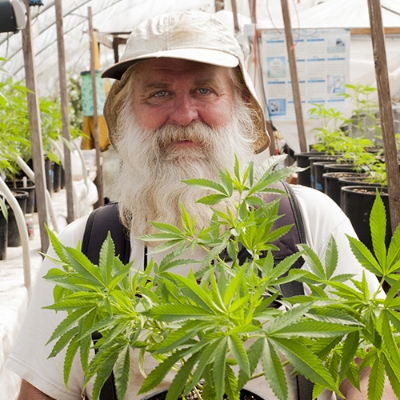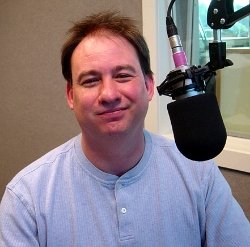Beyond 50's Top 25 Interviews
#2
The One Straw Revolution by Masanobu Fukuoka
Watch Beyond 50's book trailer on "The One Straw Revolution" that is narrated by the book's editor Larry Korn. In 1973, he was under the tutelage of his Sensei (teacher), Masanobu Fukuoka, who lived in Shikoku Island, Japan. Korn received a hands-on education in the art of non-cultivation and do-nothing, natural farming. Translated in many languages, Masanobu Fukuoka wrote "The One Straw Revolution," (New York Book Reviews), a classic memoir and guide. You'll learn about his philosophy and the Four Principles of Natural Farming: no cultivation; no chemical fertilizer or prepare compost; no weeding by tillage and herbicides; and no dependence on chemicals. Even though his methods require less labor, it can result in higher yields for your farm or garden.
Related Interview:
- NEXT -
Related Article:
Monkeys are Made of Chocolate
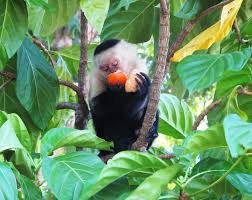
For Beyond 50's "Green Living" talks, listen to an interview with Jack Ewing, a naturalist and conservationist. He'll share fascinating stories about living in Southwestern Costa Rica at Hacienda Baru - reforesting the whole area, which was later declared a wildlife preserve. You'll understand how the animals, plants and people interact within their exotic eco-system.
The Reforestation of Hacienda Baru
In February of 1972, Ewing became a partner in the ownership of the Hacienda Baru property that is 830 acres, located in the southern Pacific zone of Costa Rica, bordering the mouth of the Baru River.
Upon purchase of the land, about 50% was selectively deforested and used as grazing land for cattle.
Some pastures on the hillside, between the entrance to the old hacienda house and Baru River, was eroding. Ewing decided to reforest the area. The hill was too steep, so the area has to be totally abandoned - not even chopping down weeds, to allow for Mother Nature to bring back the rainforest, advised an expert. Fortunately, the vast seed bank in the rest of the tropical rainforest of the reserve contributed to the rapid regeneration of the vegetation on the hillside.
In the rebounding process of his land, Ewing fell in love with the rainforest and the biodiversity of animal life within it.
Comparing Costa Rica's rainforest to the Amazon that is 300 million years old, reforestation is not possible in South America because the lands are poor in quality and infertile from having no volcanic activity (with ash falls) to replenish the soil. The nutrients are tied up in the biomass: trees, plants, and wildlife only.
After years of forest burning and cutting to make way for pasture (in the Amazon), the land has no ability to recuperate, explained Ewing.
Costa Rica is only one of two countries in the world where the rainforest is growing in land size, rather than receding.
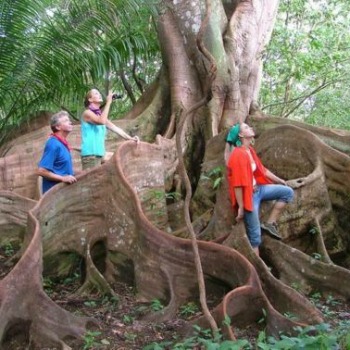
Rainforest Death vs. Rebirth
Comparing Costa Rica's rainforest to the Amazon that is 300 million years old, reforestation is not possible in South America because the lands are poor in quality and infertile from having no volcanic activity (with ash falls) to replenish the soil. The nutrients are tied up in the biomass: trees, plants, and wildlife only.
After years of forest burning and cutting to make way for pasture (in the Amazon), the land has no ability to recuperate, explained Ewing.
Unlike the Amazon, Costa Rica is geologically younger at 3 million years old and receives a constant shower of ash from volcanic activity. Over a period of 100 years, there's 2" of ash on the ground to replenish the soil.
Due to reforestation, Costa Rica is only one of
two countries in the world where the rainforest is growing in land size in the last 30 years, rather than receding.
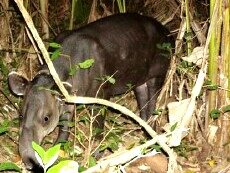
Rise of Eco-Tourism
Business partners Jack Ewing and Steve Stroud worked successfully to have Hacienda Baru declared a National Wildlife Refuge by the President of Costa Rica.
Over the years, eco-tourism has become more important than agriculture and cattle - proving that it's financially feasible to convert. Many landowners have let their land go back to rainforest. Even one of the worst poachers of Costa Rica converted to the cause: bringing in tourists for the protection of the animals.
Hacienda Baru currently receives an average of 20,00 visitors in a year and growing in numbers steadily. Full capacity for the staff is servicing 100,000 visitors annually.
Ewing's next project is in the creation of a Biological Corridor that he calls "The Path of the Tapir" to protect more valued rainforest lands and connects two areas that do have tapirs - the largest land mammals in Central America that are the size of a cow and shaped like a pig. Like the Jaquars and Spider Monkeys, the tapirs were last cited in the late 1950s and again most recently by witnesses in the last few years. The hope is that the Biological Corridor can allow for the safe passage and return of many more of them.
To Hear the Interview, Click on This: Monkeys are Made of Chocolate
Subscribe to Beyond 50's Radio Updates!
Beyond 50 values your personal information. Your email will
not be used, sold, or
shared with any outside party.

Do You Have an Amazon Echo Dot?
Just say, "Alexa, play the podcast, Beyond 50 Radio Show " to hear
the interviews.
VISIT
BEYOND 50's BLOG
BEYOND 50's
BEST RESOURCES:


